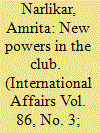| Srl | Item |
| 1 |
ID:
123534


|
|
|
|
|
| Publication |
2013.
|
| Summary/Abstract |
The multipolarity of the 21st century is fundamentally different from that of its harbingers because in the past decade change and innovation have been induced through sites of negotiation and by the establishment of intergovernmental foreign policy networks. New powers like Brazil, China and India have gained relative weight thanks to their status as agenda setters, brokers and coalition builders. This paper examines the relevance of different foreign policy networks such as India-Brazil-South Africa ( ibsa ) and Brazil-South Africa-India-China ( basic ) for their strategic approaches and argues that they are crucial vehicles for their ascension. Drawing on the work of Hafner-Burton et al, who raised the question of how states increase their power by enhancing their network positions, a typology of foreign policy networks is proposed: mediation, advocacy and substitution networks play important roles in today's shifting global order. The paper analyses how the different network types work together and how particular states have adapted better to the new environment than others.
|
|
|
|
|
|
|
|
|
|
|
|
|
|
|
|
| 2 |
ID:
096251


|
|
|
|
|
| Publication |
2010.
|
| Summary/Abstract |
No good deed goes unpunished: the WTO's timely response to accommodate the new powers-Brazil, India and China-at the heart of its decision-making has produced new inefficiencies, has heightened its proclivity to deadlock, and has exacerbated disengagement and disillusionment among all its stakeholders. Particularly in the context of a major economic crisis, a reliable international institution is necessary to ensure the continued provision of freer trade-well-recognized as the route to recovery. With the WTO's recent record to provide these necessary public goods under doubt, where do the solutions lie? This article discusses the changing role of the new powers in the WTO, and further analyses the opportunities and challenges that these developments generate. The concluding section examines possible routes to reform. While very little can, or indeed should, be done to alter the balance of power itself, it is argued that appropriate institutional reform can help the multilateral trading system retain the advances it has made on grounds of fairness and further address the concerns of efficiency that are central to the crisis that it faces today.
|
|
|
|
|
|
|
|
|
|
|
|
|
|
|
|